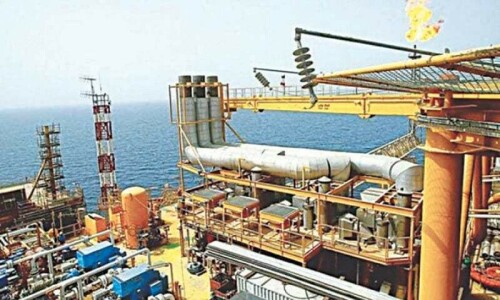LAHORE: The Water and Power Development Authority (Wapda) claims to have recorded the highest ever power generation of 37.4 billion units during the fiscal year 2019-20 (July 1, 2019 to June 30, 2020), breaking the previous year’s record of 31.17 billion units.
Earlier, during the fiscal year, 2015-16, Wapda had attained then highest generation of 33.15 billion units, Dawn has learnt.
“Getting the highest ever generation of 37.4 billion units during this period is a matter of great pleasure and honour for Wapda and its employees, as it all happened due to naturally improved hydrological conditions, completion of three major hydel power projects (Tarbela-4th extension, Neelum Jhelum and Golen Gol, good operation and maintenance of the old projects / plants / power stations and improved efficiency of the technical staff,” Wapda chairman retired Lt Gen Muzammil Hussain told Dawn on Tuesday.
“The Neelum-Jhleum Hydropower Project’s installed capacity is 969MW. And it once even touched a figure of 1,040MW. It means those deputed to operate the machines are using their skills to improve efficiency of the project,” he added.
According to Wapda, the surged hydel generation in 2019-20 not only helped the country overcome power shortages but also stabilize the power tariff. The authority successfully completed and commissioned three long-delayed mega hydropower projects with cumulative generation capacity of 2,487MW.
With commissioning of the 108MW Golen Gol, the 1,410MW Tarbela 4th Extension and the 969MW Neelum-Jhelum hydropower projects in 2018, the installed generation capacity of hydroelectric power surged to 9,389MW from 6,902MW, registering an increase of 36 per cent in just one year. Prior to this, Wapda could manage to take its hydel generation to 6,902MW in 59 years of its inception from 1958 to 2017.
In 2019-20, the hydel power generation during fiscal year 2019-20 registered an increase of 6.23 billion units if compared with that of fiscal year 2018-19. This increased hydel power generation became possible due to improved hydrological conditions and effective operation and maintenance of Wapda hydel power stations despite the Covid-19 pandemic. Had these 6.23 billion additional units been generated through thermal source, the national exchequer would have borne the brunt of Rs87.22 billion.
According to data related to the hydel power generation in 2019-20, Tarbela Hydel Power Station added 11.92 billion units, Tarbela 4th Extension 5.49 billion units, Ghazi Barotha 6.55 billion units, Mangla 4.69 billion units, and Neelum-Jhelum Hydel Power Station 4.84 billion units to the national grid. Rest of the generation – 3.91 billion units - was contributed by other hydel power stations of Wapda.
Wapda owns and operates 22 hydel power stations, including Neelum Jhelum with cumulative installed generation capacity of 9,389MW. It seems well on its way and work on three mega projects including Diamer Basha Dam, Dasu Hydropower Project and Mohmand Dam is under way, adding 9,500MW on their commissioning in future.
Published in Dawn, July 1st, 2020











































Dear visitor, the comments section is undergoing an overhaul and will return soon.